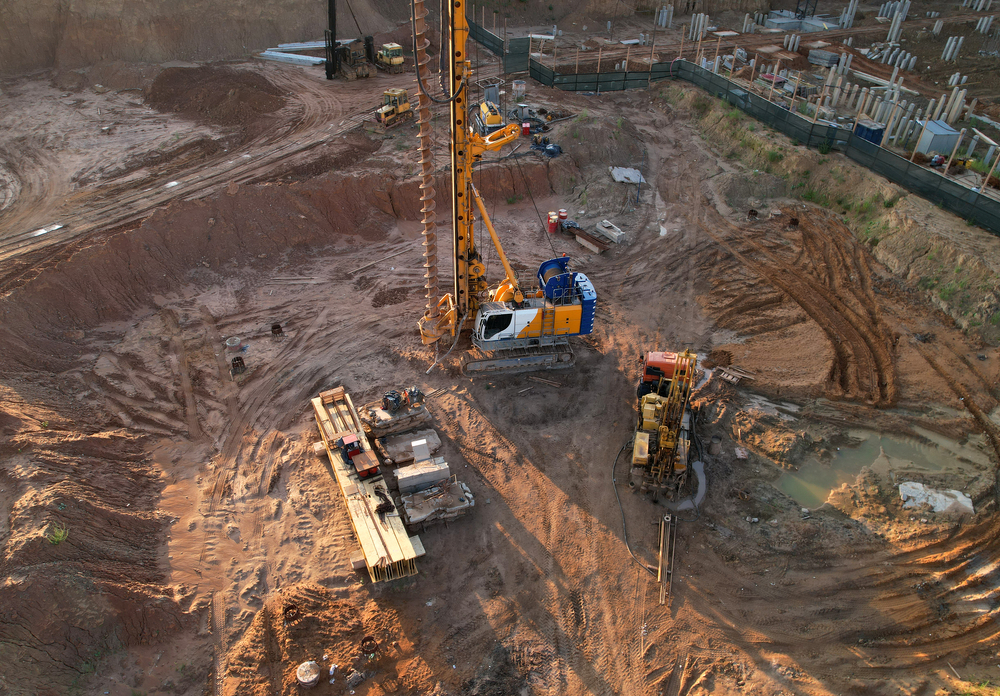Geotheta Can Be Fun For Anyone
Geotheta Can Be Fun For Anyone
Blog Article
The smart Trick of Geotheta That Nobody is Talking About
Table of ContentsThe smart Trick of Geotheta That Nobody is Talking AboutOur Geotheta PDFsThe smart Trick of Geotheta That Nobody is Talking AboutGeotheta for DummiesAbout Geotheta

They perform website examinations, accumulate samples, do laboratory tests, and analyze information to assess the suitability of the ground for building jobs - Geo Tech Engineering. Based upon their findings, geotechnical engineers provide recommendations for structure style, incline stability, retaining frameworks, and reduction of geotechnical dangers. They collaborate with other specialists, such as architects, structural designers, and building and construction groups, to make certain that geotechnical factors to consider are incorporated right into the overall job layout and implementation
By examining the actions and homes of soil and rock, they can identify prospective geotechnical risks such as landslides, soil negotiation, or slope instability. Their competence assists prevent failings or crashes that could endanger lives and building. Below are some comprehensive tasks and obligations of a geotechnical engineer: Website Examination: Geotechnical engineers conduct website investigations to collect information on subsurface conditions.
They interpret the data to comprehend the properties and habits of the dirt and rock, including their toughness, permeability, compaction qualities, and groundwater conditions. Geotechnical Analysis and Style: Geotechnical engineers analyze the data collected during site investigations to assess the security and viability of the website for construction tasks. They carry out geotechnical computations and modeling to examine aspects such as birthing capability, settlement, incline stability, side planet pressures, and groundwater flow.
Examine This Report about Geotheta
Structure Style: Geotechnical engineers play a vital role in designing foundations that can safely sustain the desired structure. They evaluate the dirt conditions and lots requirements to figure out the suitable foundation kind, such as superficial foundations (e.g., footings), deep structures (e.g (https://soundcloud.com/geotheta)., heaps), or specialized strategies like dirt renovation. They consider aspects such as settlement limits, bearing ability, and soil-structure communication to create ideal structure layouts
They evaluate building and construction plans, monitor website activities, and perform area evaluations to validate that the design suggestions are adhered to. If unforeseen geotechnical issues arise, they evaluate the scenario and provide referrals for removal or modifications to the design. Risk Assessment and Reduction: Geotechnical designers examine geotechnical risks and threats connected with the task site, such as landslides, liquefaction, or soil erosion.

Collaboration and Communication: Geotechnical designers work carefully with other experts associated with a project, such as engineers, structural engineers, and building and construction teams. Effective interaction and partnership are important to incorporate geotechnical considerations right into the total job style and construction procedure. Geotechnical engineers offer technological know-how, solution inquiries, and ensure that geotechnical needs are fulfilled.
Everything about Geotheta
Right here are some types of geotechnical designers: Foundation Designer: Structure engineers concentrate on making and analyzing foundations for structures. They examine the soil problems, tons demands, and website characteristics to figure out the most suitable foundation kind and style, such as superficial structures, deep foundations, or specialized strategies like stack foundations.
They examine the variables influencing slope stability, such as dirt properties, groundwater conditions, and incline geometry, and create methods to stop slope failures and minimize risks. Quake Engineer: Earthquake designers focus on examining and designing frameworks to hold up against seismic pressures. They assess the seismic risk of a site, examine dirt liquefaction potential, and establish seismic layout standards to guarantee the safety and strength of structures during quakes.
They do field testing, collect examples, and examine the accumulated information to define the soil residential or commercial properties, geologic formations, and groundwater conditions at a website. Geotechnical Instrumentation Designer: Geotechnical instrumentation designers concentrate on monitoring and determining the behavior of dirt, rock, and frameworks. They install and maintain instrumentation systems that check elements such as soil negotiation, groundwater degrees, slope activities, and architectural displacements to analyze performance and supply early warnings of prospective concerns.
Excitement About Geotheta
They conduct tests such as triaxial examinations, consolidation examinations, straight shear examinations, and permeability tests to gather information for geotechnical analysis and style. Geosynthetics Designer: Geosynthetics designers concentrate on the layout and application of geosynthetic products, such as geotextiles, geogrids, and geomembranes. They make use of these materials to enhance soil security, reinforce slopes, provide drain options, and control erosion.
They often tend to be investigatory individuals, which implies they're intellectual, reflective, and investigative. They are curious, methodical, reasonable, logical, and rational. Some of them are likewise social, meaning they're kind, generous, participating, client, caring, useful, empathetic, tactful, and pleasant - Geotechnical Engineers.
In the workplace environment, geotechnical designers make use of specialized software program tools to do computations, develop styles, and assess data. They prepare records, explanation testimonial task specs, connect with clients and group participants, and coordinate project tasks. The office setup gives a helpful setting for research, analysis, and cooperation with other professionals included in the job.
What Does Geotheta Do?
They often check out task sites to conduct website examinations, evaluate geotechnical conditions, and collect data for evaluation. These visits include traveling to different places, in some cases in remote or difficult surfaces. Geotechnical engineers might do soil sampling, conduct examinations, and display building tasks to guarantee that the geotechnical elements of the job are being carried out properly.
Geotechnical designers likewise function in specialized geotechnical research laboratories. Geotechnical lab engineers function extensively in these settings, managing screening tools, operating instruments, and tape-recording data.
Report this page